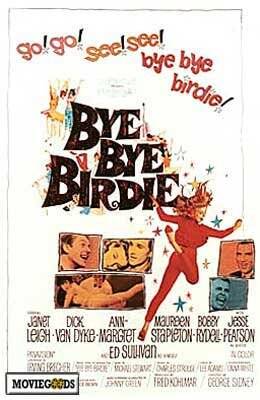As we mentioned last week, fifty years ago the Second Vatican Council was between sessions, so there was not much news coming from Rome. In the issue of April 20, 1963, the editors turned their attention to other matters of importance, while the magazine's chief film critic, Moira Walsh, assessed three new films, including an adaption of the Broadway musical "Bye Bye Birdie." Her comment is less a review of the film than an indictment of Hollywood craft:
Whenever the deleterious effects of movies become the topic of conversation, an inordinate amount of emphasis is placed on the "gamy" European imports. As far as I am concerned, the potentially most dangerous films are made almost exclusively in Hollywood. They are the ones skillfully tailored to appeal to teenagers and giving tacit, uncritical approval to contemporary teen-age mores. Incidentally, the baleful effects of these films are frequently unrecognized by the "better-films-council" type of movie previewer as well as by legislators flourishing bills demanding mandatory film classification. I am dubious about classification on a quasi-governmental basis or by the film industry itself, precisely because this kind of film is all too likely to get a clean bill of health for youthful audiences—thus glossing over a bad situation with a couple more layers of respectability and giving the public a quite unjustified sense of security.
I am sorry to pick on Bye Bye Birdie as the occasion for making this observation, because it is neither a particularly clear-cut or flagrant example of the genre. It is based on a reportedly rather rowdy Broadway musical which satirized swooning teenagers and their swivel-hipped, no-talent singing idols. Generally speaking, the movie version has been cleaned up and, though it is spotty in both pace and execution, it is often both skillfully done and funny.
If it has been cleaned up according to the letter of the law, it has also been romanticized and its satire blunted—which makes it more likely to be swallowed whole by an uncritical audience. Also it is now on the screen, where a bad camera angle can belie a professed good intention. For example, the movie is supposed to be satirizing the Elvis Presley "below-the-belt" school of vocalizing, but it hedges its bets somewhat by photographing the gyrations of Conrad Birdie (Jesse Pearson) in a deliberately suggestive fashion. Again, the 16-year- old small-town heroine is played by Ann Margret, an extremely knowing little actress of 20 plus, as far as her performance goes. Once more the story tells us one thing while the camera says something entirely different.
Until a substantial number of opinion-makers have seriously applied themselves to a course in "film techniques, their use and abuse," they are likely to be outmaneuvered every time in any showdown with Hollywood over movie morals.
You can read Walsh's full review here, which includes her take on Alfred Hitchock's "The Birds." Over the coming weeks we will continue to highlight what America was writing about 50 years ago.








